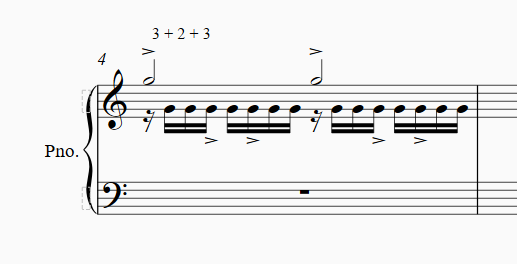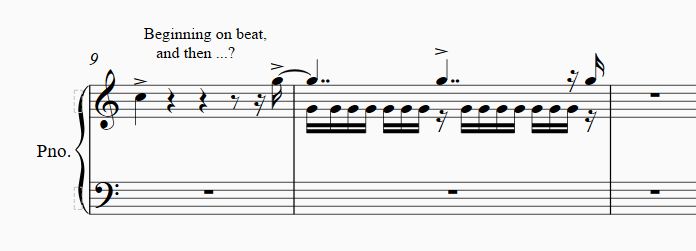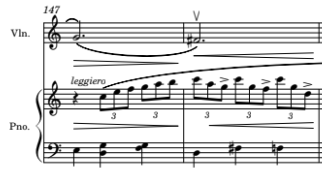Leaderboard
Popular Content
Showing content with the highest reputation on 06/05/2023 in all areas
-
Now that I've had time to listen to all of the preludes, I'm going to go ahead and write more of my thoughts here on one post rather than post them on all the separate posts. Prelude 1: in addition to what I already said above, I think it's great when preludes both work as a part of a cohesive whole in the set, and also could work if just plucked out and played on its own without context. This piece is just really well-constructed and well thought-out, you could really just play it by itself, and even though that's not necessary, it's still worth mentioning, I think. 2: Just gorgeous. And yes, mss. 4 & 6 are very "Final Fantasy", and that's fine. This piece is interesting to me, because it feels like a "what-if" on the development of the 1st prelude. As in, "what if I stripped the jazziness and the moody whole tone harmonies from the first prelude?" And this piece comes out kind of naturally as a result. So in a way, it almost feels like a "reduction" of first prelude, at least in terms of its "language," which makes perfect sense as a form of development. 3: And then this one is the exact opposite. "What if I cranked the moodiness and more jagged harmonies up to max?" This one's just genuinely brilliant (and props to the subtlety of the performer, playing the r.h. with a very slight "swing", giving an illusion of triplet, causing the rhythm to feel "off" somehow, but in a way which complements the discomfort of the piece). Sincere, profound. Bravo! 4: Another really cool piece. However, this is a classic example of a composer's intention and what an audience would hear just not quite coming together. You're wanting the top voice to sound like it's offbeat, like so: But what it actually sounds like, is: And so it is syncopated, but not the way the score indicates that it wants to come across as. And so, I wondered what could be done to help bring your intention across without ripping the entire piece's intestines out, and what comes to mind is something like: So, basically, some way to announce clearly to the audience what the beat actually is, (maybe even adding another opening measure) and then purposefully undermine it with your intended offbeat. Because otherwise, even looking straight at the score while listening, it's really hard to hear an "offbeat" at all. 5: Kefka xD Always popping in at the most inappropriate places and doing the most inappropriate things. I don't have a lot to say, but I will say that the L.H. chord on ms. 14 is perfection, and is so deliciously and comically evil, like kicking a grunt off a bridge or something, LOL. 6: I think this piece is lovely, but I do have a few critiques. The C natural in the L.H. in ms. 11 sounds fine in those thirds, but after ms. 12 being Cb, ms. 13's C natural sounds rather "dorky" for lack of a better word, and I think it would be better just going ahead and making it a Cb like you do in the following measure on 14. Also, I like the crescendo from mss. 25 - 28, but I think the FFF is too much for the climax, as it's not quite "earned" in terms of emotional weight. I think a F, maybe a FF at most, followed by a less pronounced pause. This feels more like a poignant story, but the kind that is told in passing, not one that causes a pause and deep reflection. But that's just my opinion. 7: BAHAHAHAHA Brilliant!!! "Praise Jesus" made me guffaw! Oh Lawd have mercy, I couldn't hardly read the score. I live in Southern USA, and this dialect is just killing me. But red neck stuff aside, the music is totally and utterly convincing. This one's a surefire crowd-pleaser, no doubt about it. Pieces like this that allow a performer to let loose and play with more "sloppy charisma" are some of the most fun to play, as well. Again, brilliant, well done! *clap clap clap* 8: Those quartal harmonies and mysterious scales are really absorbing. The shadowy part at mss. 15 + 16 complement and contrast the angular sound of the constant quartal harmonies: I kind of wish you had leaned into those phrases just a little bit more, because in context, they sound amazing. But it's better to be left wanting a bit more, than for something to overstay its welcome. I think you probably agree it sounds awesome, seeing as how you ended the piece on the same riff. (On a side note: that is a well-earned FFF.) The 9ths starting at ms. 25 took some getting used to, but I think a live performer would help bring out the "crunchy" textural purpose of the chords better than MIDI is capable of doing, so that's worth considering. 9: God, this one is just cool as hell. The 7/4 time somehow sounds completely organic and natural, and your way of developing the material is smooth as silk. This one's a masterpiece, honestly. 10: This one is cool, and so clever. If I'm not just hearing things, it sounds like there's a lot of echoes of previous things that happened in previous preludes: quartal harmonies and scales, "Kefka's return" at mss. 41 - 46, 7ths reminiscent of the 9ths in the 8th prelude at mss. 124 - 132 for their textural component (and a striking D7 chord at ms. 156 that's been consistently striking since first coming around in the 17-18 mss. of the very first prelude). Structurally speaking, this piece just really "fits" in the grand scheme of the whole set, and adds to the cohesiveness of the whole. Not to mention it just sounds awesome. 11: And so, my current impression is that prelude 10 is actually the "ending" of the set, with so much being summed up, and this 11th prelude is actually a short "interlude" which leads into prelude 12, which I assume will be an "epilogue." Am I correct? Let me listen and see. 12: I think so. I listened to this one first, since it was the first one I saw, and now after more context, it seems a natural epilogue. Instead of the jagged edges that the quartal harmonies and clustered 2nds have brought, we now have a resolution to conflict, and the harmonies uplift, bringing about an ending. Even the more discordant section results in a clear resolution. In my life, I've learned to appreciate both "happy" endings and "sad" endings, and it feels right that this one ends on such a positive note. Really, this is an excellent set of music. I think there are a few little weak links in the middle of the set, but overall, this is A+ material. Thanks for sharing, it's been great listening to them 🙂 (Forgive me if some of my feedback is nonsense, lol)2 points
-
Hey I'd be excited to hear what you come up with... or anything new from you! Have you been writing still? I remember your music always had a clever character of your own, I miss hearing it. @Henry Ng Tsz Kiu's playing on this was wonderful, he really helped make the music come alive.2 points
-
The finale to season one is almost here. Here's episode 10. Features include a fantasy/improvisational form, diminished scales, and relentless tinkering with motivic development. Comment my faults, plz1 point
-
Hi everyone! I'm here to present my most recently finished work, the first movement of my String Sextet in G-flat major. I name this piece a subtitle of Heaven, Earth and Human to express my view on their relationship. (What a self bragging guy this is...) The piece is dedicated to my friend Johnson Ho. Guys and gals, please help me pray for his declining health and wish him all the best. He is definitely one of the reason why I start this piece and the reason why I finish this piece. Special thanks to @Thatguy v2.0 with his always original ideas which sparked my inspirations and new thoughts. Every time after discussion he always gives me new ideas on my composition and musical idea. And he's the one who make this audio perfect in my opinion. Thx so much and I'm so happy I get to know you in this forum and become friends with you as my musical guidance. I will post the mp3, pdf and YT video here first since I'm going to brag all those details after it haha🤣: Final First Draft of First Movement of String Sextet.pdf Final final first draft 01-06-2023 First Movement of String Sextet in G flat major.mp3 https://youtu.be/cI8MAn2XEPk If you don't want to read them, just ignore them!! (spoiler alert)😀😃😄😁😆😂🤣🥰😍🤩😘🤑😵🤢🤮🥶😨😱😭(spoiler alert) (spoiler alert) 😀😃😄😁😆😂🤣🥰😍🤩😘🤑😵🤢🤮🥶😨😱😭 (spoiler alert) (spoiler alert) 😀😃😄😁😆😂🤣🥰😍🤩😘🤑😵🤢🤮🥶😨😱😭 (spoiler alert) (spoiler alert) 😀😃😄😁😆😂🤣🥰😍🤩😘🤑😵🤢🤮🥶😨😱😭 (spoiler alert) (spoiler alert) 😀😃😄😁😆😂🤣🥰😍🤩😘🤑😵🤢🤮🥶😨😱😭 (spoiler alert) This piece is inspired by the thoughts of the great New-Confucian Chinese philosopher, Tang Chun-i. I immerse much in his philosophy and am always delighted reading his huge books. This work is particularly inspired by his thoughts of 9 states of mind, and I really hope I can depict what I feel towards the ninth state, the state of Heavenly(天) Morality Transcending (sorry for my bad English Translation... but this is way too technical for my standard....), his philosophy and Chinese thoughts in general. I choose G-flat major as the tonic since 1)the initial inspiration comes in this key, 2)it's the key of transcendence for me, 3) I want the sound less bright by get rid of those open strings notes, since truth for me is Aletheia in Heideggerian sense, which is hidden but to be disclosed only, rather than a bright thing to have. I know there are some discussions concerning key choice of strings recently, so I'm clarifying here. I had my initial thoughts for this piece in 2021 May when I woke up midnight, but then I was busying with my composing of Clarinet Quintet in C minor and thus ignored it. I wished to continue it in 2022 August after finishing my Quintet, but find it real hard to continue since I don't have the craft to do it. Until I joined YC and saw the following two posts: (Hey Jean @Jean Szulc I said I would learn something from your piece, and this is the product!!!!🤘🤘🔥🔥 Thank you! Will you post here again?) (Yo Vince my bro!!!🤘🤘 Thank you!) These two are absolutely great pieces (go check for them! Vince's piece is still on the "Our Picks" section) and they use the quartal harmony so well. I also learn from Jean's piece on the more extended techniques for strings. Then I had some ideas to finish the piece. This one gonna be something Chinese which is weird in a sense that despite being a Chinese I never write something Chinese. It's always Beethovanian and I really would like to reduce that element in my new piece. After writing the Clarinet Quintet in C minor, especially after having complete an all-controlling piece (esp. the 4th movement), I realized that I have too much reliance on forms and motives and I hope I can make them less explicit in my new piece. I love sonata form very much, but you cannot compose every pieces in it. And for me all the hard work pays off. For the instrumentation is two violins, two violas and two cellos. I love how the addition of 1 extra viola and cello (to a standard String Quartet) thickens the voice and strengthen the middle and low registers. It also gives more chance for viola and cello to sing while having their partners doing the accompaniment. For me the violins stand for the Heaven, violas stand for human and cellos stand for earth, though this is not mandatory interpretation of the piece as it's not always strict imagery. The structure of this piece is more a 3 part one. I have added some rehearsal marks on it to indicate the parts, and I will describe below with some (hopefully) interesting thoughts: (Timepin according to the video) First Section: 00:06 A, main theme. The accompanying texture comes from the first movement of Brahms's String Quintet no.2, one of my favourite of his piece. It starts with viola to emphasize the human call for me. Notice the theme in viola II in 00:23. That theme will appear throughout the whole movement. (Is this a Qi(氣) theme?)00:31 another important theme. 00:38. I like this theme for its contemplative nature. The theme comes from my Clarinet Quintet in C minor. Can you find it? I find it two days before in a wonder LoL. 00:54 B, continuation in high register with added voice. 01:24 C, transition, old theme disguised as a new one. 01:54 D, in D flat major/Mixolydian. The "Heaven" section in my original planning. 02:36 E, continuation in G flat major. 02:59 F, I love the conclusion in 03:13 very much. Modulate to C major to next section in 03:42 and I love the transition so much since it's real hard to compose. 03:42 G, the "Earth" section in my original planning, with cellos taking the lead 04:12 H, repeating the earth section in G-flat major 04:35 I, closing of first part, one of my favourite portion of the movement. I especially love that A-flat major outburst in 04:46. It's magical and I have no idea where does it come from as I only realize it's composed after I finish it. I always imagine Leonard Bernstein conducting this part, LoL. Very synchorinzed here, but it's denied and turn to minor (which will be further developed in the 2nd movement) Second Section: 05:21 J, the minor section. I believe this is the worst part of the movement but Vince's audio saves it. It appears a bit anguished here. The new theme in 05:28 is the basis of both section II and III. Some sort of fugato and imitations happen here though it's not time for it. 06:47 K. I love this part!! Very fluent in violins, and I like 07:06. It's a diminution of the theme of the previous part. I use sul ponticello here to make the sound more silvery. 07:29 L. Trying to reach back to opening section by quoting the first three notes of the theme. But it's external only since it's in F sharp major. Maybe the key difference is only visual and I may change it to G flat major. Also I don't know whether the harmonics work for the violins. I like this section though. 08:24 M. A pizzicato section further developing what's doing in part L. Daniel @Omicronrg9 must have inspire me for this part. I like the contemplativo section in 08:56 too with some call and response between the two violas (humans) 09:34 N. Transition to section III. I freakingly love this part! The transition for me is smooth, and it's transforming the minor theme of section II to a major/pentatonic one. Third Section. 10:05 O. Introduction of the fugue subject. 10:20 is the start of a triple fugue, with the subject in Violin the main one for me. 10:52 theme from 00:38 quoted. Subject through G flat, Eb minor, G flat. 11:10 P. First longer episodes, theme from part F quoted Subject through D flat. I love the preparation for the first climax of the fugue in 11:41. I love the climax in 11:48! Subject in G flat. 12:03 Q. Another episode to direct to C flat major. Themes in part D and the theme in 00:31 quoted. Subject in C flat and A flat minor 12:42 R. The great Con spirito! One of my favourite portion of the movement, The A-flat major is chosen to echo in climax of section I in part I. Final appearance of the subject of the fugue in climactic G-flat major, and leads directly to the coda. In 13:17 I have a moment when the first cello is higher than the violins to correspond with a Chinese philosophical concept in the book of Change, when the power of earth is up and the power of heaven is underneath, it's auspicious since the heaven and earth are communicating instead of isolating themselves. The Chinese words 乾下坤上 is written in the score though lest you know Chinese haha! 13:28 S. Coda, with a decreasing of tempo. I am initially perplexed whether to write like this, since my little Wind Quintet piece has kind of same treatment in its coda. But I just decided to write like this since it's beautiful and the two pieces are interconnected anyway. I want this passage to be like human successfully synchronize with the heaven and earth. It's quite similar to a Chinese opera here in my opinion. I freakingly love that half cadence in 14:03!! The coda ultima in 14:08 is written much earlier, in Nov 5th 2022. I know the conclusion but find the ways to it very difficult. But I'm happy I am able to achieve this ending!! This plan to be a 2-movement work, but I'm not gonna compose the 2nd movement until I'm ready. It will be very different from this movement though. It's such a long post LoL. Feel free to criticize or critique it if you have anything you don't like about it, or compliment it if you want! I don't mind any comments and I will love to have all of them whether they are long or short, good or bad, positive or negative! Thanks for listening! If you happen to read through this LONG post, thanks so much for it!!!!! I have too many things to tell LoL. Love y'all!! Update: The first part of the second movement of this Sextet is posted on Jun 2024: The second part of the second movement of this Sextet is posted on Jan 2024: And here is the entire second movement posted in March 2025: Henry1 point
-
The main rhythm that starts this piece off was an old guitar riff I've had from years ago. I always wanted to make it a song, but just never did. So I decided maybe as a piano piece it would be cool. The b.29 rhythm came from it as well. Let me know what you think, I'm always eager for feedback and criticism 😄 EDIT: 🔥🔥🔥🔥🔥🔥🔥 HENRY 🔥🔥🔥🔥🔥🔥🔥1 point
-
I got stuck on this one, and worked on all the others after it while I figured out what I was trying to go for...I think. At any rate, thanks for all who have been checking these out. This one's based in Bb, dabbles at quartal harmonies, and features wide extremes in dynamics. EDIT: Henry's performance1 point
-
It's that time again. I may have gotten weird with the score.1 point
-
A beautiful performance of a lovely prelude. Congrats to both the composer and performer!1 point
-
Haha thank you! It's a pleasure to play Vince's preludes since they are lovely isn't it? Yea look forward to your new works! I am a relatively new member here as I join only for 9 months and would love to see your most recent works! Henry1 point
-
Yes, he did a really great job playing the piece. Can't beat a live performance! Personal circumstances have prevented me from writing as much as I'd like to, but I have written some new stuff recently. I might post something at some point 🤷🏻♂️ we'll see.1 point
-
This is awesome! My favorite schema is actually the one you extracted - Le Temps. Where did you find this beautiful progression? I will refer to your works when I (someday hopefully) hope to study galant schema in as much depth as you have dedicated to them. The melodies in this piece have a very bittersweet melancholy mood to them that I love. Thanks for sharing!1 point
-
I've know I've mentioned a bunch of things about this piece to you already, and I've heard this in it's entirety roughly 700 times , but I figure I'll share some thoughts here as well. This is EASILY my favorite piece of yours. You're so knowledgeable about music and composition and it always shows in your music, whether it's this or the () piano piece or anything else. But some of your other pieces to me just show how knowledgeable you are and what a fine and thoughtful craftsman you are. This music however shows me a bit of who you are. It's just so delightfully you. Sure, there are your influences that shine through in this piece, but I think you also give us a healthy imaginative soundscape for us all to bathe in, one that couldn't have been crafted by anyone but you. It's my favorite thing about the music. Onto the music: You had my attention right away with the first A section. There's innocence and a jovial quality to the music, vibrant and fervent in all it's themes and textures. The themes from this section got stuck in my head for days, and on several occasions I listened to this without the score or critical producer ears on and just enjoyed it for what it is. I like the heavier static textures in this section, they kind of remind me of the 1st mvmt. of Beethoven 6. Those con spirito spots were awesome as well. The B section grew on me after the first listen, which btw I'm glad you didn't go crazy heavy with the counterpoint there. I didn't feel like it would have needed it, but perhaps a tease of it for movement 2? I absolutely love the pizzicato section here though. The return of the A material was nice and expected and ofc needed imo. I love all the surfing you did through various keys, and you always kept the material refreshed. There was so much thought put into this, through the vast array of textures and clever tossing of themes through the different instruments. I'd also like to say, that even though I'm praising this piece very highly, I don't want you to think this is the key to your success as a composer. Write pastiche Beethoven if you want to, or stray away from pentatonics in the next one, or write a dense fugue after this. The point is, to me this was the first time I truly heard your own voice through your music, and no matter the medium or ensemble, I hope that your voice is always intertwined with the music that you write. For the future, I'd say the only thing I would change is how you're using the hairpins for dynamics. Our only real issues with playback were the long stretches on phrases with constant hairpins but not giving a dynamic marking. I think it'd be fine for real musicians, but since we're relying on computer playback for now, I think it just confuses Sibelius. Aside from that, your score was phenomenally clean. A couple spacing issues here and there, but no big deal otherwise. Great work Henry, it was fun to work on this with you. Trust me, it wasn't a ton of work, mainly just fixing volume issues. I'd happily do it again. Thanks for sharing this wonderful music with us!1 point
-
Yo are you back dude?!? Thanks for checking this one out man, I'm glad it had just the right amount of syrup for you. I wanted something simple and sweet, I thought of the ode to joy melody when writing it. 😄1 point
-
I know I'm hearing something good when I listen to the piece, and it makes me want to try composing something a different way or in a different style. ("Ooh, I wanna do that!") I love the jazz licks you add here and there, I find them to be "tasty", like the perfect new spice on a meal that you don't expect. But what I really appreciate is the opening whole tone row -- every time I've tried to incorporate one by design, it just ends up sounding like an uninspired imitation of Debussy. But ending it the way you did by just going back to the A minor is so simple, but effective. Really awesome stuff, thanks for sharing!1 point
-
I absolutely loved this. The vibe is sincere, and it really drew me in. When it comes to pieces like this, I find that it tends to be a bit too "syrupy" for my tastes, but I felt like this had the right amount of sweetness without going overboard. I think the piece exhibits some subtle humor and irony throughout the wistful atmosphere, too, and that really helps.1 point
-
I listened to your most recent update in A major. Many have already remarked about the playability of the piece, but this stuck out to me: (measure 136). The bottom two notes are impossible to play since the next available string on the Violin after the low G is a D. But, I'd like to make some remarks about the pieces character. In my opinion, the piece sounds more like a tame stroll through a park on a lovely day rather than a "Grande" waltz. And there are some weird things going on tonally giving the piece an unsteady sense of key center (although some might think that this gives the piece a unique charm). The following measures stick out to me in this way: The F#'s in measure 148 are out of place and sound foreign, not to mention creating an awkward false-relation between the F#'s and F naturals. The harmony itself is also not very clear in that measure. Is it a D major chord? D minor? D sus4? D7? It doesn't know what it wants to be and it comes off as insecure imo. But that's just my own cursory impression of the piece. Thanks for sharing!1 point
-
1 point
-
Alright, well, this post will be a bit different. I had this whole plan, and no.3 was in the works. Sort of a jaunty jumpy upbeat kind of thing. I've been conscious of the order I'm writing these in, as I've almost been treating this like a suite. But as with anything in life, it takes it's turns. And recent events have made me write this one instead. I've noted everyone's comments so far, and am very thankful for all the feedback. My main goal with all these pieces is to make it friendly to any intermediate player, myself included. It's been fun so far, and I think you'll find the playability in this one the easiest of the first three. But, unfortunately I'm ending this post on a sad note. When I went to work today (for those that don't know, part of my income is teaching guitar and piano. I have a piano in my office/room), I couldn't help but to start hitting the keys as emotions have been heavy with me. For a little bit, this piece came out, and when I was done at work, came home and notated it all out. Honestly nothing has felt easier to me than writing this one. What it make lack in technicality and possibly musicality, I think it makes up for in mood and the words I've been wanting to say. I hope you enjoy this one, even though it's on the darker side. I'll also take this opportunity to those that venture in my post, to say that I'll be leaving YC for a while. I don't feel right being here right now. This piece is written about and dedicated to someone here, who I viewed as a friend. But I'm heartbroken from recent discoveries and events. I feel rotten, and gross, and cheated, and lied to. Maybe I'm overreacting, as I've been told I do, but I just can't hold back. I can't and I'm not able to bury some things deep down; this is something that I take very seriously. And when trust and honesty is broken, I feel broken. I don't know, I'm just rambling now. But what I'm getting at is that I love this place, and hope you all keep composing. I'm very excited to hopefully find the courage to come back and cast my emotions aside to hear all the wonderful and great pieces so many members here are capable of. But I just can't do it now. Good luck with music to you all, see you after a while. EDIT: another fantastic @Henry Ng Tsz Kiu performance1 point
-
Well I listen to my own recording and still feel touched lol. It's like another unknown person who plays this. I certainly enjoy playing your preludes very much that's why I keep trying to play them! Henry1 point
-
I am a real badass as I've forgotten to mention I've charged Vince $10000000000000000 for each prelude recorded. So I am already a trillionare now! Henry1 point
-
Hi Vince, Music-wise it is very touching and grievous. I deeply enjoy the sadness in it and appreciate your output. What is musciality actually? For me is to able to express something you feel and think musically conVINCEingly. This is very successful in depicting the sadness you have. It's of course sad to hace sadness in life but to express the sadness through music is great aesthetically and therapeutically. This piece is definitely a bitter one with that predominant blue notes and minor-major seventh and major seventh chords. Simple, yes, but there are many stories under that simplicity. It's very difficult to bestow meaning and stories to those seemingly simple chords and melodies but you succeed in achieving all these. Technically it's not easy at all if you have to play the music with this kind of heavy emotions. I am sad and glad at the same time you make this. I am sure I will play this and record this since I utterly enjoy the sadness in it (ofc I am not being masochistic). This is the best creative condition we can have: There's a must we ought to finish our works. I hope by writing this you will feel better, and beware of hyper-creation since I had a similar experience: I finished the Wind Quintet piece in 9 days in a period of hyper fascination but I had become ill for nearly a month after that. I don't know what happen between you and your friend, but I want to say that we all have to take good care of ourselves in order to enjoy and review works from others. Of course I would love you to come back asap since I am very happy and grateful to have known you and received your warm compliments and encouragements, but I also know that it is a good choice to leave for a while to take care of yourself to preserve your love for YC and music. I know you are very busy recently and need time to recover from that, and I hope you can recover soon. I also hope that next time you will come back with the prelude set finished and share them to us again if you are couragious enough to come back. Henry1 point
-
Thanks guys! Interesting take, Peter. What's funny is it started as a chorale, was twice as long, and had the arpeggios enter in the middle. I ultimately thought it was too much, and reminded myself that these are preludes. Plus, the chorale-ness felt boring until the arpeggios anyway. I'm glad you found yourself listening to the rhythm in a different way, it wasn't intentional but I think it's cool you heard it like that. Thanks man, this was my nocturne prelude idea. I usually always go for unexpected turns and interest with the harmony, so I'm glad you enjoyed that. I was going for extended chords that sounded lush and not-so-jazzy. I also ripped off Liszt's Un Sospiro with the ending theme, but hey. The end was my favorite part 😄 My thoughts exactly! oooooh you're right! I'm taking your suggestion and changing the score to reflect that, thanks! I agree. I slapped on pedal markings to go with the chord changes, but I think I should've considered the melody a bit more when doing so. Thanks for the tip!1 point



.thumb.png.8b5b433a341551e913a34392660bc95b.png)





